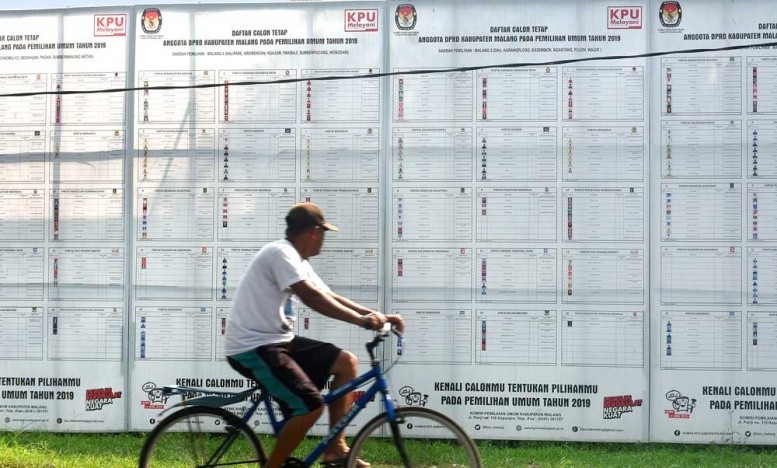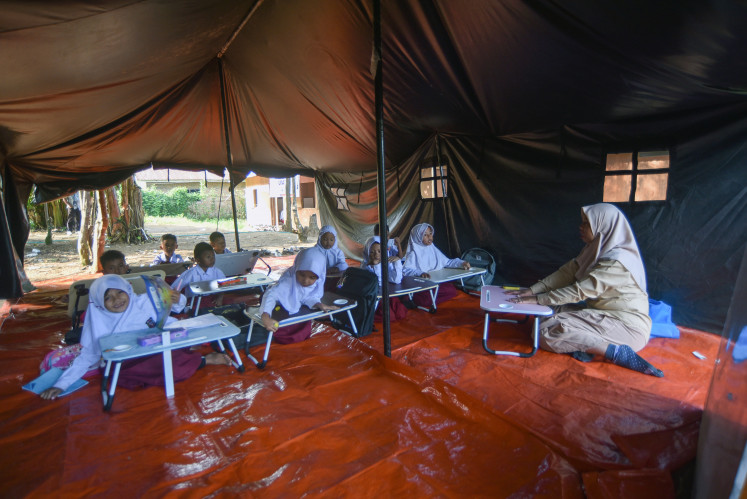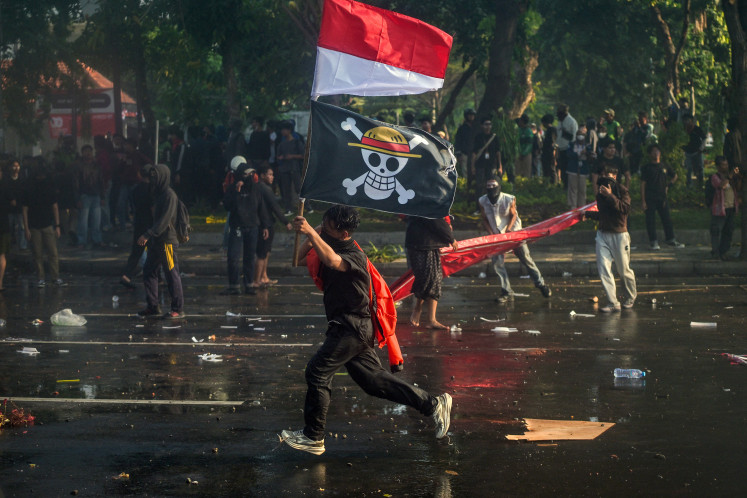Popular Reads
Top Results
Can't find what you're looking for?
View all search resultsPopular Reads
Top Results
Can't find what you're looking for?
View all search resultsPerppu urgently needed to delay local elections
Postponing elections should provide the opportunity for regional heads to focus on overcoming and managing the pandemic.
Change text size
Gift Premium Articles
to Anyone
F
ollowing the rapid increase of confirmed cases of COVID-19, the General Elections Commission (KPU) decided on March 21 to delay four stages of the regional head elections, scheduled to take place simultaneously this year.
The delayed stages are the inauguration of voting committees; verification of support for independent candidates; establishment of neighborhood committees for final voter list committees at the neighborhood level and the finalizing of the voter list itself.
The local elections in 270 regions had been scheduled for Sept. 23 in nine provinces, 224 regencies and 37 municipalities. The President should immediately issue a regulation in lieu of law (Perppu) to delay the elections for regional heads; and the impacts to be anticipated following the delay of these elections.
As regulated in the 2016 law on the election of governors, regents and mayors, simultaneous elections of these leaders and their deputies are to take place in September 2020 to replace those elected in 2015.
This year’s regional head elections would have been the fourth wave of simultaneous local elections held since 2015. In November 2024, another wave of local elections is scheduled to cover 542 regions.
Based on a 2009 KPU regulation on local elections, postponing the above stages would delay the whole schedule to at least three or four months from Sept. 23.
Finalizing the voter list, for instance, would have needed four months, from March 27 to July 20, on the original schedule. This is the most tiring, longest stage with more intensive activities compared to other phases.
As the election organizer, the KPU does not have the authority to delay the local elections and can only postpone the stages of the elections, while the authority to delay the election schedule falls on the House of Representatives.
However, making limited revisions to the 2016 Regional Elections Law would take a considerable amount of time; therefore the most sensible and immediate legal solution would be a regulation in lieu of law.
The pandemic has led to many countries delaying elections. At least 12 national elections and 20 local elections in 30 countries have been delayed according to International IDEA.
So far, scenarios to delay the election stages in Indonesia include delaying them by three months to December; or six months to March 17, 2021; nine months to June 23 and 12 months to Sept. 29, 2021.
A hearing attended by the Home Ministry and election organizers — the KPU, the Elections Supervisory Agency (Bawaslu) and the Election Organization Ethics Council (DKPP) — among other things, agreed to delay the elections; to request that the government issue a Perppu on the issue, and a request for regional heads to reallocate the budget for this year’s local elections to fight the pandemic.
The optional schedules should refer to indicators of the pandemic — such as declining confirmed cases to a certain level; a decrease in areas exposed to the pandemic within a region, decreasing death toll and improvement in health facilities for COVID-19 patients.
This would require transparency of the government to reveal relevant data. Synchronizing the data at the national and local level is necessary to avoid mistakes in decision-making.
Rescheduling the elections indeed hinge on the development of the pandemic. An ideal scenario would be to delay the local elections by one year instead of this December; or at least delay them by six months to March 2021.
The delay of the entire schedule would affect several crucial regulations, which should be covered in the Perppu, as there would be several implications.
First, implications for the term of elected regional heads; based on the 2016 Regional Elections Law, those elected in September 2020 would serve four years.
A one-year delay would mean they would have a three-year term until the next general election in November 2024. The government would then have two optional scenarios.
Under the first scenario, a delay of one year, local regional heads would serve for only three years if the following local elections were still scheduled for 2024. This would likely lead to fewer candidates than in the earlier election.
Further, regional heads would not likely achieve much in only three years as eligible incumbents would immediately prepare for reelection.
Under the second scenario, the terms of regional heads would remain five years, with the consequence of revising relevant regulations regarding the 2024 simultaneous local elections.
The second scenario would enable a more effective performance by local administrations and would ease the workload of election organizers who must prepare the 2024 elections. This option would be more attractive to the House factions.
Second, implications regarding vacuum positions in the event of delaying local elections. The government would need to prepare around 270 high ranking officials along with supporting regulations to be installed as provisional replacements of regional heads.
Third, implications on regional budgets, as the House, the Home Ministry and election organizers had agreed on the need to reallocate this year’s local election budgets for efforts to handle the pandemic.
Fourth, implications regarding candidacies within political parties. Postponing the local elections will likely lead to parties revising their stages of candidacies for regional heads and their issuance of support letters to candidates.
The delay would give a considerable time for candidates who are running against incumbents, to introduce themselves to potential voters. Meanwhile, incumbents’ electability would be influenced by their leadership and performance in handling the current pandemic.
Issuing a Perppu and determining when the elections will be rescheduled is crucial to provide certainty for election organizers regarding preparations for the elections; local legislative councils to determine the allocation of election funds in their respective regional budgets; political parties to determine schedules for their selection of regional head candidates and the issuance of their recommendations for candidates; and certainty for candidates on when they can introduce themselves to the voting public.
Postponing elections should provide the opportunity for regional heads to focus on overcoming and managing the pandemic.
Electoral and political calculations should not hamper the immediate issuance of the Perppu on postponing local elections; it is urgently needed to guarantee the safety of election organizers, citizens and candidates during the pandemic, apart from providing political certainty.
The House and election organizers have taken the initiative to push for the immediate delay of the elections. The ball is in the government’s court.
______
Researcher, Department of Political and Social Change, CSIS Indonesia. The original article was published in CSIS commentaries.










